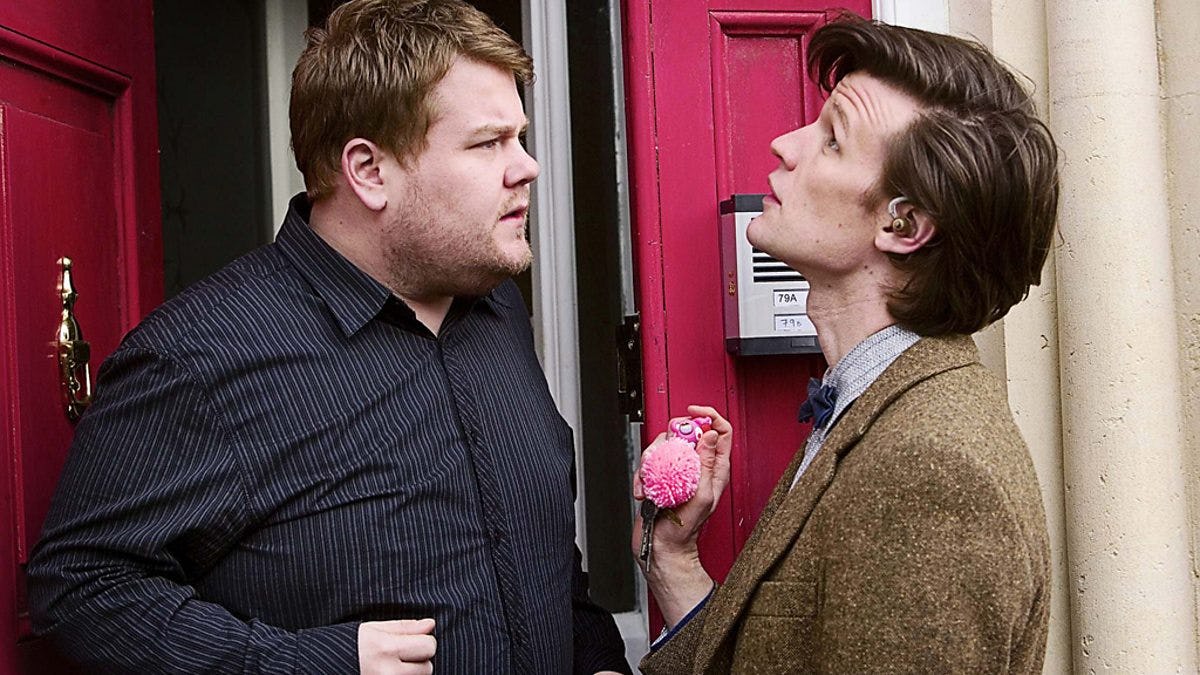
What’s better than a Time Lord saving the universe? If you were a fan of Doctor Who in the 3rd Doctor era, in which Jon Pertwee wore frilly shirts, the answer was clear: The adventures of the Doctor were made better when the Doctor couldn’t always jump in the TARDIS and disappear. Grounding the Doctor, forcing the clever Time Lord into more terrestrial, everyday situations, paradoxically makes the stakes seem higher.
And, 15 years ago, in Matt Smith’s first triumphant season of Doctor Who, one episode dared to go back to the Jon Pertwee-ish formula from the 1970s, with a twist. While 2010’s Doctor Who Season 5 has a lot of bright spots, the hilarious episode “The Lodger” still holds up to today because it dared to combine the vibe of the 3rd Doctor with a straightforward sitcom.
Today, the first season of Steven Moffat’s tenure as showrunner of Doctor Who is sometimes regarded as a golden age. But, on June 12, 2010, we were still in the middle of it, and on some level, the Matt Smith era was still convincing us that we could live without David Tennant. Yes the season had just reached an apex with the near-perfect episode “Vincent and the Doctor,” but it wasn’t really an episode that was technically about the Doctor. In fact, between Amy Pond’s troubles and Rory getting erased from existence, we hadn’t really gotten to know the 11th Doctor all that much, simply because all the dashing about had slightly obscured how different he was from Tennant’s 10th Doctor.
But with “The Lodger,” the 10th episode of Season 5, and the episode that aired the week before the two-part season finale, Doctor Who took a moment to pause, and put the 11th Doctor into a sitcom with James Corden. For American fans, James Corden of 2010 wasn’t as famous as the James Corden of 2025, meaning, at the time, this gimmick didn’t seem like a celebrity guest star, but rather an instance of the Doctor becoming roommates with a regular guy. After the TARDIS refused to land, the Doctor decides to hang out in modern-day Colchester and figure out what’s going on. This leads him to move in with Craig Owens (Corden) in order to trace the source of the alien mystery.
The resolution of said mystery, or the sci-fi reasoning behind any of this, is hardly the reason why this episode holds up well. There’s not really a big reveal here, nor should there be. The episode works because putting the Doctor, specifically, this Doctor, into a fish-out-of-water story is inspired. Written by controversial scribe Gareth Roberts, the strength of “The Lodger” isn’t so much in the set-up, but rather, how Matt Smith plays it. Yes, you could imagine another Doctor in this situation, but what Smith reveals about his Doctor is that he’s goofier and less self-aware than his predecessor.

Perhaps the best example of this is when the Doctor joins a game of football with Craig and all his buddies and proceeds to utterly dominate in a way that is both hilarious and slightly endearing. You can’t really imagine Tennant’s Doctor doing this, because there would have been a lot of gritting of teeth and big explosions of “OH YES!” Instead, Smith’s natural ability to do physical comedy excels at nearly every point of this episode, and that talent is 100 percent connected to his subtlety.
If anything, one of the best reasons to rewatch “The Lodger” is to watch Smith act not just with his excellent, and endlessly contortable face, but also to witness him act with his entire body. By the end of his tenure, some of the 11th Doctor’s mannerisms would become a bit more predictable, perhaps even rote. But here, the way the Doctor tries to act “normal” is pure comedy gold, and, because this is still only his first season, a moment for a ton of invention and innovation from Smith.
“The Lodger” might not be the best Matt Smith Doctor Who episode of all time, but it was certainly a pivotal one. It hinted the 11th Doctor could exist without Karen Gillan’s Amy, it showed off how funny Smith could be, and also proved, beyond a shadow of a doubt, that this iteration of Doctor Who could vacillate wildly between genres. Because after doing a great sitcom with “The Lodger,” the following two episodes would bring about the end of the world as we knew it.







